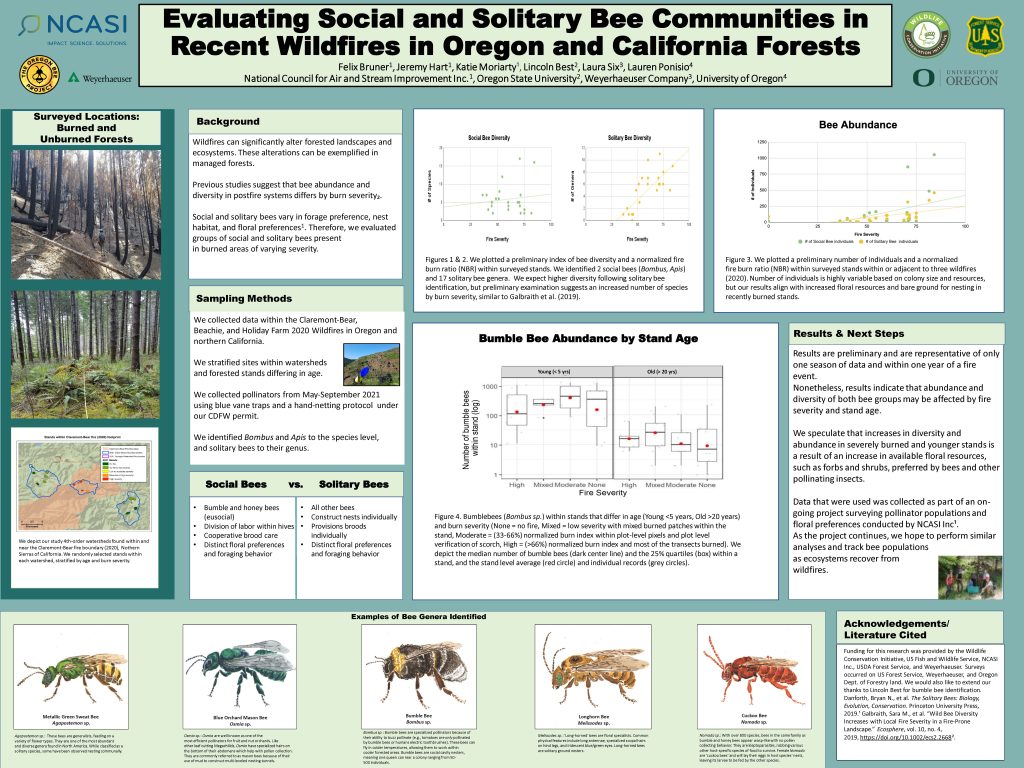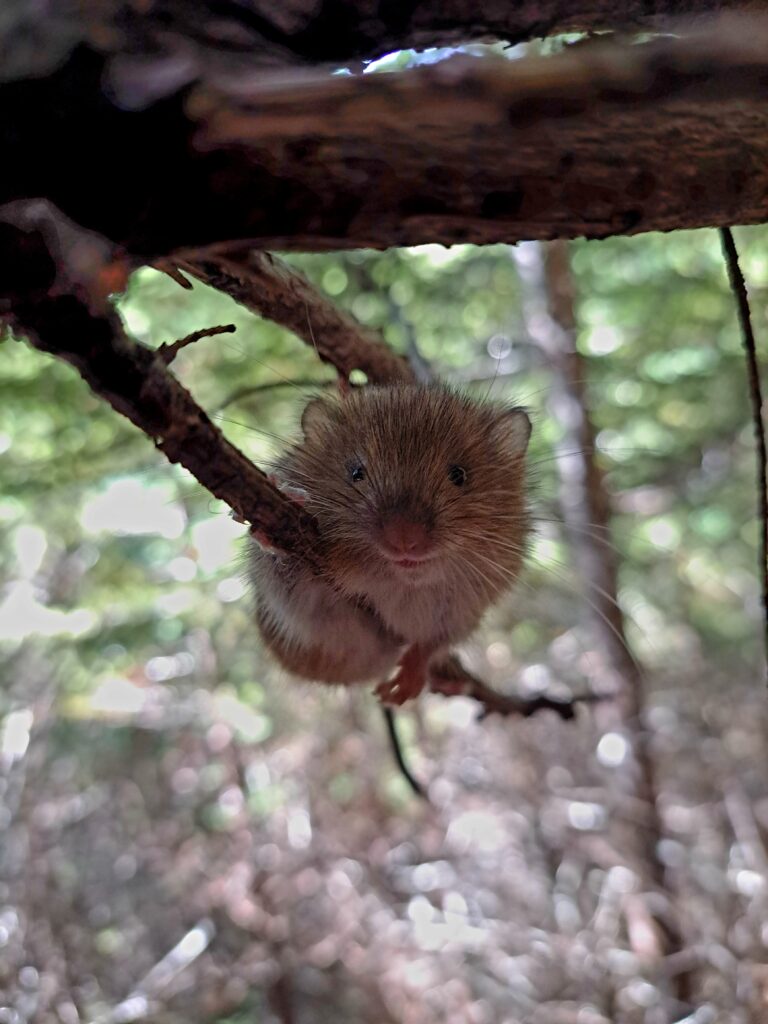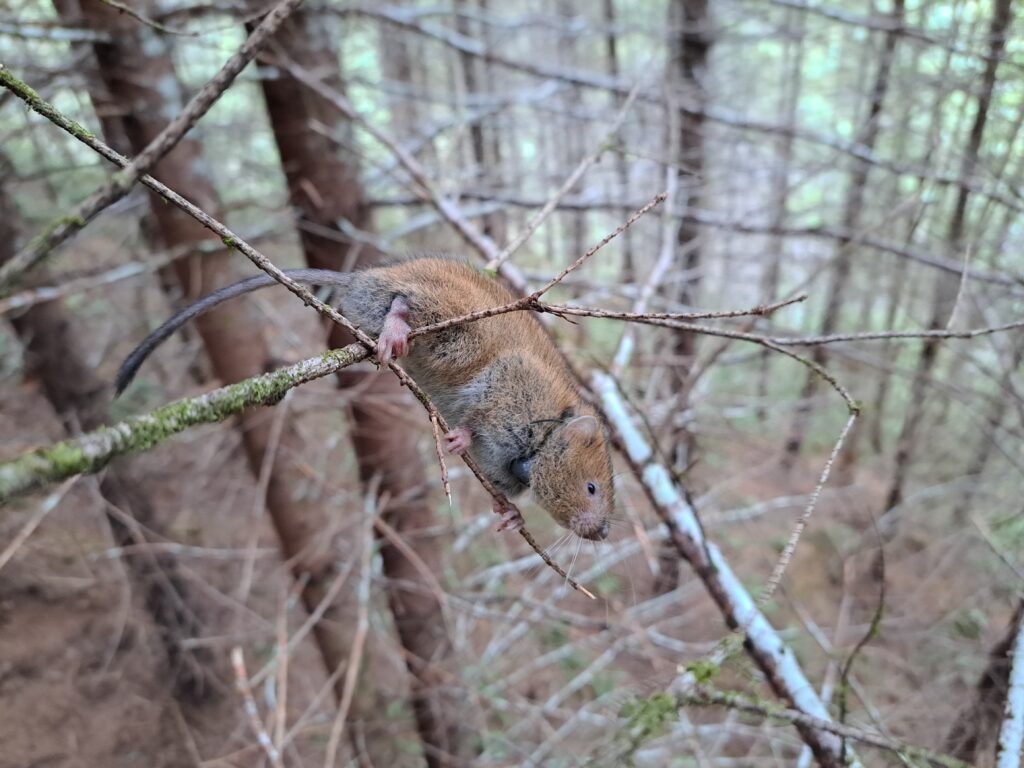Wildlife Conservation Initiative: Quantifying the contribution of sustainable forest practices to at-risk species and terrestrial and aquatic communities
Principal Investigator: Dr. Darren Miller, Vice President, Forestry Programs, NCASI
Collaborators: National Alliance of Forest Owners (NAFO), Sustainable Forestry Initiative (SFI), U.S. Fish and Wildlife Service
Supported by: U.S. Fish and Wildlife Service (Award F20AC00018 for $1,439,238), NCASI, and SFI (NFWF Grant 0407.24.081582 for $244,510).
Project Summary: The overarching premise of sustainable forestry is that realizing value via forest management can be accomplished on the landscape while providing ecosystem services, such as biodiversity, at sufficiently broad scales of space and time. Although widespread certification of forests in the southeastern U.S. provides assurances of sustainability, further understanding of the role of private, working forests for conservation of at-risk species is needed. The purpose of this project is to quantify the role of working forest landscapes in conserving species-at-risk and maintaining aquatic and terrestrial communities. Specifically, we seek to examine species from multiple taxonomic groups over an extended time horizon in a landscape dominated by certified, private forests managed primarily for timber production.
Species being surveyed include wood turtles, avian communities on managed forests, and Diana fritillary butterfly (Northeast); ecology and management of wood turtles on private working forests (Lake States); Gopher tortoises, terrestrial reptiles and amphibians, birds, aquatic species surveys, and crayfish surveys (Southeast); mussel surveys in western Louisiana (Southwest); pollinator use of forests, red tree vole use of young forests, Pacific marten ecology and distribution (Pacific Northwest); pollinator use of forests, western pond turtle distribution and occupancy (Northern California).
Research is being conducted by partners across the U.S. These include Tangled Bank Conservation, Michigan State University, U.S. Geological Survey, West Virginia University, Louisiana Department of Wildlife and Fisheries, Cornell Lab of Ornithology, University of Maine, and NCASI, Inc.
Related Reports and Publications
Birds
- Breeding, stopover, and wintering habitat in the eastern US and the role of private, working forests (Final Progress Report November 2024)
Prepared by: Courtney Davis, Guillermo Duran, and Viviana Ruiz-Gutierrez, Cornell University and the Cornell Lab of Ornithology - Improving management strategies linked to certification of sustainable forest practices for priority songbirds in West Virginia (Progress Report 2023)
Prepared by: Christopher M. Lituma and Robert M. Ryan, West Virginia University, Division of Forestry and Natural Resources; and Petra B. Wood, US Geological Survey, West Virginia Cooperative Fish and Wildlife Research Unit, West Virginia University
Wood Turtles
- Population and Movement Ecology of Wood turtles (Glyptemys insculpta) on Maine’s Working Lands
Prepared by: Matthew Chatfield, Project Lead, and Sequoia Dixson, Project Graduate Student - Working Forests and Wood Turtles: Forest Management Effects on a Species of Conservation Concern (2023 Final Report)
Prepared by: Dr. Gary J. Roloff and Tricia Brockman, Michigan State University; Dr. Darren Miller, NCASI; and Brad Potter, US Fish and Wildlife Service
Bee Communities
- Pollinator patches within a forested matrix: describing biodiversity along a gradient of stand, watershed age, and fire severity (Progress Report FY 2022-2023)
Prepared by: Katie Moriarty, NCASI - Project Poster – Click to download the PDF

Red Tree Voles
- Describing red tree vole demographics in younger forests (FY 2023-2024)
Prepared by: Katie Moriarty, NCASI - Jason Piasecki’s tree vole thesis – Download paper


Mussels
- Mussel Surveys in Streams That Drain National Alliance of Forest Owner Properties (2023 Final Report)
Prepared by: Sean D. Kinney and Beau B. Gregory, Louisiana Department of Wildlife and Fisheries
Butterflies
- United States Fish & Wildlife Service Science Applications – At-Risk Species Program: Diana Fritillary
Prepared by: West Virginia University
Humboldt Martens
- Using DNA metabarcoding to evaluate complicated relationships and inform restoration opportunities for species of conservation concern: describing plant-pollinator networks and diet of forest carnivores (FY 2022-2023)
Prepared by: Katie Moriarty, NCASI - Describing Humboldt marten movement and basic population demographics in areas that differ in management intensity (FY 2022-2023)
Prepared by: Katie Moriarty, NCASI
Terrestrial and Aquatic Communities
- Quantifying the Contribution of Sustainable Forest Practices to at-risk Species and Terrestrial and Aquatic Communities (Submitted to: Sustainable Forestry Initiative, Inc.) (Final Report 2025)
Prepared by: Joseph J. Apodaca, Ph.D.; Hope Killian; Alex Krohn, Ph.D.; and Julianne Pekny, Ph.D., Tangled Bank Conservation; and Jim Godwin, Auburn University - Quantifying the contribution of sustainable forest practices to at-risk species and terrestrial and aquatic communities (Final Report 2023)
Prepared by: Joseph J. Apodaca, Ph.D.; Hope Killian; Louisa Collins; and Alex Krohn, Ph.D., Tangled Bank Conservation
Contact Darren Miller at dmiller@ncasi.org